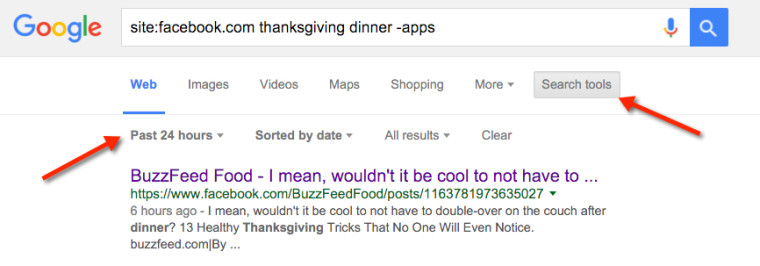When someone comments on an article, site, or forum, they are entering into a discussion about a specific topic, with the goal to discuss it further or learn more about it. This provides the important elements needed to bring value to the conversation without requiring anyone to visit the URL, but allows the URL to be there for those who want more context, which is also likely to be the ones you really want reading the content anyhow. Tip: You can do Google searches, such as ‘site:facebook.com topic of interest’ and then use Search Tools > Last 24 hours, to identify recent opportunities. One thing I like to avoid on Twitter is identifying tweets through #hashtags, although I know a lot of people will disagree with me on this. I feel that #hashtags is too overly spammed, so instead, I like to make lists of people who are authorities in topics I have content around, so that when I see conversations relating to topics I have something to contribute, it is more natural and not associated with some #hashtag bandwagon spamming. Quora, Wiselike, and Other Answer Sites This is probably one of the best places for content marketing through comments, as people on these sites are specifically looking for information. It is still very important to be on topic and relevant, as you want to make sure that the people looking for answers are finding the answer in whatever you are providing. Tip: Use sites like Redditmetrics.com, to identify the best subreddits for your topics. Tip: Participate on the forum for a while before trying to leave any URLs in comments. I would love to hear your thoughts about content marketing through comments in general, as well as about any other sites, tools, or tactics I missed above.

Join us for one full day of SEO and SEM tactics in Chicago this May 11th! Get ahead of your competitors and better your business with new insights from industry experts on hot topics like link building, content strategy, paid search, and on-page SEO. Group rates now available. Register today!
Virtually everyone who creates content wants someone to see it, read it, and hopefully engage with it. The desire is so strong in fact, that we have an entire industry dedicated to accomplishing that goal: Content Marketing.
We have learned over time that just because an article is visible, doesn’t mean people are actually reading and engaging with it, which is ultimately our true goal.
You have likes, shares, visits, and other metrics, to help you determine the success of your content, but ultimately it is comments that really tell us how engaged people are.
When someone comments on an article, site, or forum, they are entering into a discussion about a specific topic, with the goal to discuss it further or learn more about it. So, participating in comments can be a very effective way of presenting someone useful content at the time when they are most likely to consume or engage with it.
I know what you’re thinking already… ‘Oh great, is he really suggesting we comment spam?’ Of course not! Like any tactic, using it incorrectly will result in little to no real success, and more often than not result in some sort of penalty. This is also the case with content creation, linkbuilding, on-page SEO, etc.
That said, there are a lot of opportunities to effectively market your content in comments, which is what I want to talk about here.
Facebook, LinkedIn, Google+, etc
Most social sites out there have updates, where you have the ability to respond to those updates with discussion points, and when relevant, links to related content. I typically like to combine both of these angles, by providing a related and helpful URL, but then also quoting the elements I think is most important to the existing conversation.
This provides the important elements needed to bring value to the conversation without requiring anyone to visit the URL, but allows the URL to be there for those who want more context, which is also likely to be the ones you really want reading the content anyhow.
I also never force a URL to fit. The goal is not to find some loosely related topic and then stretch your participation for the sake of making a URL fit, but rather to find conversations that could truly benefit from the URL and comments you would add.
Tip: You can do Google searches, such as ‘site:facebook.com topic of interest’ and then use Search Tools > Last 24 hours, to identify recent opportunities.

Tip: For LinkedIn, you can also select the drop down menu next to their search box and then select Posts. Enter your desired topic and then sort by recent posts, to find recent opportunities around topics of interest.

Tip: Searching on Google+ will bring up the ‘best of’ articles for any searched topic, with an option to sort by ‘most recent’ as well. Also, clicking on Explore and checking the Trending topics, is a great way to find posts trending and everyone clicking on those…

COMMENTS